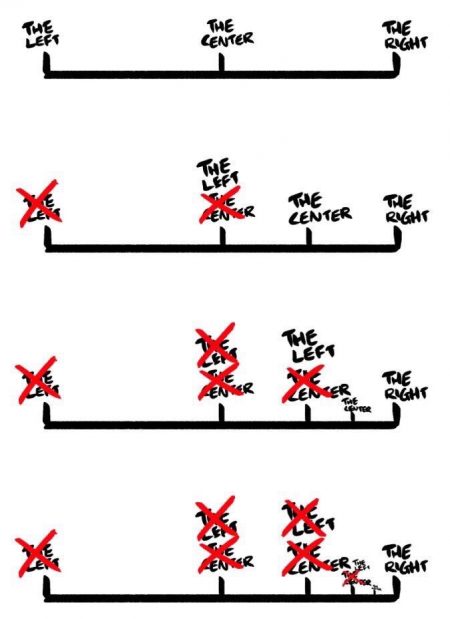By Seattle DSA organizer Keaton Slansky
“Compromise” has been endemic to American politics for as long as many millennials (and anyone else that’s unable to recall the Reagan presidency) can remember. They can never remember a time when the Democrats weren’t trying to “meet the Republicans in the middle,” and now, in 2017, an entire generation is starting to realize the failings of the “reach across the aisle” style of politics popularized by the Democrats. Coming at politics from a place of compromise instead of a place of strong policy and a desire for robust reform has failed the Democratic party, and so many people who put faith in the supposedly “left” electoral spectrum.
To combat this brand of extreme compromise to the point of inaction, it’s important to consider that politics and compromise are definitively not one and the same. Debate is inherent to politics, and there will always be opposing factions and parties vying for power, thinking their system or policies are better than the “other.” Historically, however, it doesn’t stand to reason that politics is compromise.
I believe in the importance of electoral politics, and I also think that if we aren’t critical in the way we on the Left approach politics, we aren’t going to get anywhere. That being said, compromise is not the way forward. We live in a late-stage-capitalist-climate-change hellscape, and the Right has not ceded ground or ideology since the ‘70s, so there is no reason we have to meet them on their terms. We only have to look to the massive popular momentum of candidates like Bernie Sanders at home and Jeremy Corbyn in the UK. While Bernie isn’t president, and Corbyn isn’t PM (yet), their candidacies demonstrate that people want robust reform, bolstered social services, guaranteed human rights and an elected official that’s accountable to the people. To be completely honest, Corbyn is more exemplary of this than Bernie, as Bernie did all of these things yet compromised initially by working within the framework of the Democratic Party.

While “liberal” or “progressive” (now relatively hollow words, anyway) politicians have been busy bending over backwards to compromise to the hardline demands of the right, the Democrats have been shifting right until we’ve ended up with a modern political spectrum that looks something like this.
In the past, political capital, power and victories have not been won through compromising with the opposition party, but by presenting a more robust and appealing set of policies than the opposition, and leaving it up to the people to make their decision. The American political behemoth has become intensely partisan, so this has resulted in a late-stage manifestation of politics as compromise, at least as far as the Democrats are concerned. Over the years, the right has stuck hard to their stances and only drawn deeper lines in the sand and pulled politicians to the right on hundreds of issues, now resulting in a world where any decision or proposal the Democrats want to make has an inherent, almost Stockholm syndrome-like contingent built into it, so as to say “How will the Republicans like this? How will we get them to?”
A crystallizing moment for the Democrats in becoming the party of such compromise is the election and presidency of Bill Clinton in 1993. Racial tensions and the national discourse around “crime” reached a fever pitch as 12 years of hard-right police and prison funding from Reagan and Bush Sr. (shockingly) seemed to just make the problem worse. Instead of offering an alternative to state violence and mass incarceration as someone on the “left” traditionally would, Clinton put votes over lives, campaigning on strong support of the death penalty which he had already pre-emptively enforced as Arkansas governor. In his Presidential campaign, he thinly veiled his messaging as “Order and Safety” while promoting an easier military-to-police-force pipeline, expanding militaristic “Boot Camp” programs for first-time offenders and encouraging local police forces to hire 100,000 more officers through federal funding.
As president, Clinton signed the “Violent Crime Control and Law Enforcement Act” in 1994. Colloquially known as the “Crime Bill,” it boasted such draconian policies as mandatory minimum sentencing, a “three strikes policy”, “Truth in Sentencing” (eliminating parole), the creation of 60 new death penalty offenses, and the elimination of higher education for inmates. This, while funneling massive funds into prisons and police forces set the stage for our modern carceral state and militarized police force. Clinton then signed a bill maintaining that punishment for crack cocaine continue to be 100x harsher than for powder cocaine, regardless of the 100-1 ratio having been cited as “a primary cause of the growing disparity between sentences for black and white federal defendants.” It was later found that “more federal inmates were added to prisons under Clinton than under presidents George Bush and Ronald Reagan combined.” This was the “center” the Democrats had fought for and, ultimately, won.
Our recent idealized sense of discourse is the manifestation of this same compromise mentality, and you’ll often see those trying to “be above the discourse” by lamenting faults in both sides of an argument which can result, disgustingly, in things like Trump’s now-infamous “both sides” handling of the Charlottesville tragedy.
The Democrat’s strategy of extreme compromise has failed, and now a far right government has majority control of the American government.
Beside the fact that the Democrats’ ideology shifts constantly, the Democrats are also beholden to corporate interests and capital, work closely with and are influenced by lobbyists, put the needs of the few over the needs of the many, and fail to address the many crises we’re currently in. These traits are traditionally ascribed to the Right, but it’s important to keep the Democrats accountable as well—while the Republicans are definitely fiendish capitalist ghouls, a lot of Democrats are quick to be wolves-in-sheep’s-clothing for capitalist interests (this is exemplified by lack of “progressive” enthusiasm for single-payer healthcare).
It is clear we live in dire times, that compromise politics are not working, and we need a new way forward especially in the sphere of electoral politics. Leaders like Corbyn have shown a desire for true reform and refusal to compromise can work in the interests of the people, and the more voters break down the ideology of compromise, the more we can stand in solidarity against extremism, austerity, and the means-tested measures that got us here in the first place. A better world is possible.
Unless expressly stated, Dispatches do not necessarily reflect the views of Seattle DSA as an organization or its leadership.

2 comments on “The Case Against Compromise Politics”
Comments are closed.